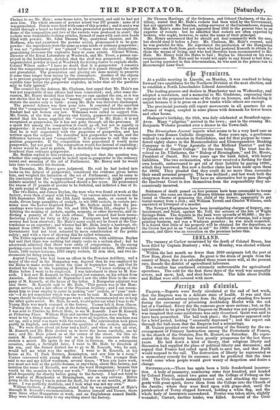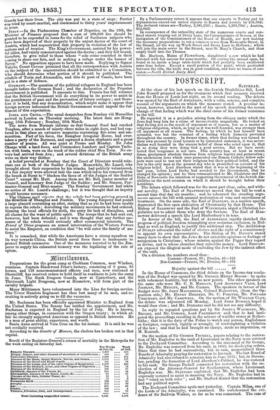intrigu filth taluttial.
FRANca.—Reports were freely circulated at the end of last week., that the Empress was in a delicate state of health. It was said that she had sustained serious injury from the fatigue of standing five hours during the ceremony of presenting Archbishop Morlot with the red hat of a Cardinal. Every day the rumours grew more serious ; but, as the ball intended to be given by the Empress on Monday was not postponed, it was imagined that some misfortune was only threatened. Quiet was said to have been prescribed. The ball took place ; the Emperor appeared only for a brief period, looking "unusually depressed" ; and the report ran through the ball-room that the Empress had a miscarriage.
M. Guizot presided over the annual meeting of the Society for the en- couragement of Primary Instruction among the Protestants of France, in the church of the Oratoire, Rue St. Honore, on Saturday. He repre- sented that the Society has been greatly prosperous for the last three years. He laid down a kind of theory, that religious liberty and discussion had supplied the place of political liberty and discussion ; and argued that France had called upon Faith to save her, and that Faith would respond to the call. The destruction of liberty he represented as a momentary rethedy for its excesses; and he predicted that the time would come when people would grow weary of despotism and desire a change.
SwirzueLAsm.—There has again been a little Sonderbund insurrec- tion. A body of peasantry, numbering some four hundred, and headed by Colonel Perrier, seized two gates and the College of Friburg on the 22d. The Civic Guards instantly turned out, and attacking the insur- gents with great spirits drove them from the College into the Church of the Jesuits ; where they were fired upon with grape-shot, until the parish-priest of Torny stepped forward, holding a white flag, and the whole body of insurgents surrendered. Perrier was taken alive, slightly wounded; Carrart, another leader, was killed. Several of the Civic
Guards lost their lives. The city was put in a state of siege : Perrier was tried by court-martial, and condemned to thirty years' imprisonment in irons.
ITALY.—In the Piedmontese Chamber of Deputies, on the 19th, the Minister of Finance proposed that a sum of 400,000 lire should be granted to be expended in loans for the relief of Sardinian subjects who have been deprived of their property by the unjust decree of the court of Austria, which had sequestrated that property in violation of the law of nations and of treaties. The King's Government, assisted by his power- ful allies, had vainly remonstrated against the decree ; and they felt bound, therefore, to give relief to those whose "sole crime consisted in their coming to share our fate, and in seeking a refuge under the banner of Savoy." No opposition appears to have been made. Replying to Signor Valeno, Count Cavour promised that all the correspondence with Austria on the subject of the sequestration should be submitted to a Committee, who should determine what portion of it should be published. The citadels of Turin and Alexandria, and tete de pont of Casale, have been put in a state of defence.
GeamArrr.—The question of the political refugees in England has been brought before the German Blind; and the declaration of the Prussian Government is published. It amounts to this. Prussia has full reliance that the British Government will do everything in its power to assist in the punishment of past and the prevention of future outrages ; and there- fore it in held, that any demonstration, which might make it appear that foreign powers influenced the British Government would impede the ful- filment of this expectation.
INDIA AND Ciinui.—The usual despatches from Bombay vifi Marseilles arrived in London on Thursday morning. The latest date are Hong- kong, 25th February ; Bombay, 29th March. The news from Burmah informs us that General Steel had reached Tonghoo, after a march of ninety-three miles in eight days, and had cap- tured in that plaoe an extensive magazine containing fire-arms and am- munition. Part of his force, the Ramghur Irregular Horse had over- taken a party of the Burmese, and captured a dozen elephants and a great number of ponies. All was quiet at Prome and Meaday. Sir John Cheape with a land force, and Commodore Lambert and Captain Tule- ton with boats, were on the track of the robber chief Mea Toon. No en- voys had arrived from Ava ; and several divisions of the British army were on their way thither.
A belief prevailed at Bombay that the Court of Directors would rein- state one or both of the Budder Judges. Meanwhile, Mr. Luard, who brought about their suspension by his attacks, had publicly volunteered, if a fair inquiry were allowed into the case which led to his removal from the bench at Surat to "blacken the faces of all the Judges of the Budder Court" except Mr. Hutt. Among them are Mr. Bell, junior member of Council, and honorary first Judge of the Budder; and Mr. Simson Pay- master-General and Mint-master. The Bombay Government had taken no notice of Mr. Luard's challenge; but it was thought that an inquiry would become necessary.
The Chinese mail esr=4. i=e1 1,see eateieg emend in the direction of Shanghai and Nankin. The young Emperor had posted a large placard containing an edict, stating that as yet he had been unable to repress the rebels describing the military movements he had ordered, blaming the local officials for sloth, the army for lack of discipline, and all classes for the want of public spirit. The troops that he had sent out, however, had been defeated ; and it was thought that any further suc- cesses of the rebels would seriously affect commercial interests. The Friend of China proposes an armed intervention of the Western Powers to assist the Emperor, on condition that "he will enter the family of na- tions."
It is remarked, that while the Americans have a strong squadron on its way towards China, the British naval force there is inadequate to protect British commerce. One of the measures resorted to by the Em- peror to supply his exhausted treasury was the legalizing of the sale of opium.



























 Previous page
Previous page